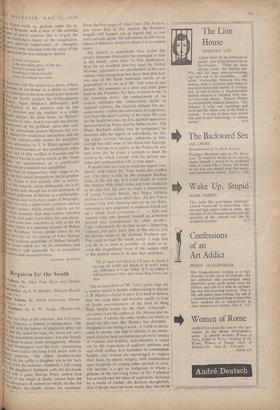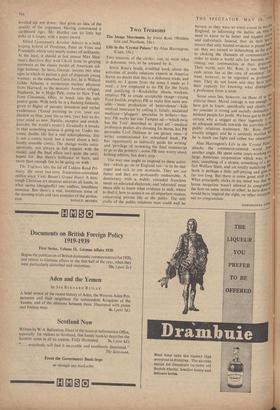. v oo ce. 1 8s.)
By L. P. Hartley. (Hamish
Its.) ,l'euchers. By G. W. Target. (Duckworth, 11. 16s.) s thelast May of the old time, and in Fairfax rititY. Virginia. a funeral is taking place. The rich with the odours of dogwood, dewy red th 4nd the salted herrings the slaves are scrv- ,° the assembled connection--- kin and friends t` e (lead woman, from GeOrgetown. Alexan- fp than(' Washington over the river–murmuring e lawn before the long brick house with its tying galleries. The eldest brother-in-law LACes by the coffin, a daughter sits in the back cur with the widower. Suddenly a tall young Narthe daughter's husband:calls for his horse, feet or the ritual of death: cannot bear the ti; e°nspiracv of custom in which, on the rim e',ahyss. the • family cluster for assurance. • From the first pages of Allen Tate's The Fathers, you know that in this version the Southern tragedy will happen not as legend but as one man's private agony. He will receive its full shock naked of defences, unable to share it or to endure alone.
The mystery is underneath what bushel this novel's immense distinction has managed to hide in the twenty years since its first publication. Save for an excellent post-war essay by Arthur Mizener, reprinted as an introduction to this new edition, what recognition has there been that here was one of the finest American novels of its generation? It is not as if Mr. Tate were an un- known : his eminence as a poet and critic goes back to the Twenties. Yet here, it seems to me. is his crowning work : the embodiment of his critical attitudes—the conservative belief in regional cultures, the classical distaste for per- sonal excess—within the conviction of experience, free from the aloof Latinity of his verse. His case for the South becomes the live, painful opposition between George Posey and his father-in-law. Old Major Buchan's culture may be antiquated, his manners take no regard of individuals, his fail- ing estate survives because, unknown to him, George has sold some of his slaves into Georgia. But he belongs to a society as the Poseys do not; and from this he draws a strength to meet the realities by which George, with his private pas- sions and unchannelled will, is torn apart.
It vyould take too long to trace the superb com- plexity with which Mr. Tate works this conflict out. The story is told by the youngest Buchan, Lacy, in his old age. It is a joy simply to watch the mastery with which tense and tone modulate as he dips into the past to evoke a tournament of young Virginia bloods, two Negro children picking lice from each other's hair, the first Union corpse lying with bleeding ears on an inn floor; emerging to give judgment in cadences which call. up a whole dead civilisation (`.- . a bold and insolent man who deemed himself an aristocrat beyond any consideration for other people'). Lacy understands his brother-in-law's despairing violence, but parts from him in the end to join his private cause to the doomed Southern one. You need to read the whole novel—I urge that you do so as soon as possible--in order to re- ceive the magnificent force of the sudden shift to the present tense in its last four sentences.
I'll go back and finish it. I'll have to finish it because he could not finish it. It won't make any difference if I am killed. If I am killed it will he because I love him more than I love any man The juxtaposition of Mr. Tate's great elegy for a society makes it doubly embarrassing to discuss L. P. Hartley's Facial Justice. It is hard to believe that this inept little anti-Socialist squib--a kind of feeble over-extension of the kind of thing Peter Simple writes for the Daily Telegraph— can come from the author of The Shrimp and the A»entone. I admire his other books too much to dwell on this one. Mr. Hartley has sketched--- imagined is too strong a word---a world so devas- tated by atomic war that it -submits to an anony- mous dictator bent on stamping out every instinct of violence and hoStility. Individualism is wiped out by the imposition of uniform opinions and sack-cloth clothes. It is forbidden to contemplate heights, and women are encouraged to replace their faces, by plastic surgery, with standardised ones incapable of rousing either passion or envy. The heroine 'is a girl so disfigured, in whom a glimpse of the 'surviving tower of Ely 'Cathedral has reawakened the sense of aspiration. Sickened by a world of clichés, she declares thoughtfully -that if people must be made equal, they should be levelled up, not down : that gives an idea of the quality of the argument. Having constructed a cardboard tiger, Mr. Hartley can do little but poke at it limply with a paper sword.
Alfred Grossman's Acrobat Admits is a bold, leaping hybrid of Perelman, Peter de Vries and Pirandello which very nearly comes off brilliantly. At the least, it should at last unseat Max Shul- man's Barefoot Boy with Cheek from its greying eminence as the classic model of American col- lege humour. Its hero, George, invents two alter egos in which to pursue a pair of disparate young women: to the suburban Cairo Joy, he is Willard Gibbs Altheim, a mysterious nuclear physicist from Harvard; to the neurotic Austrian refugee, Stephanie, he is Hugo Pale, come to New York from Cincinnati, Ohio, to break into the epic poetry game. With both he is a flashing fantastic, given to flights of parodic invention and verbal exuberance ('Good morning to you, your eye shadow so blue, your tits so two, your hair so do, your mind so new, Natalie, receptor and switch- boarder, the world's oyster'). Gradually it breaks in that something serious is going on. Under the comic double life lies a real schizophrenia; this is not a .comic novel, but a novel about a bril- liantly unstable comic. The change works retro- spectively, not always in full rapport with the reader. and the final effect isn't quite the unity hoped for. But there's brilliance to burn, and more'than enough fun to be going on with.
The Teachers lifts the lid off Liddon Road Pri- mary, the most lust-torn, frustration-convulsed edifice since Vicki Baum's Grand Hotel. A nice, tough Christian art mistress unravels all knots, in what seems (designedly) one endless, breathless sentence. But there's a real, boisterous sense of the teeming trials and rare ecstasies of the profes-







































 Previous page
Previous page